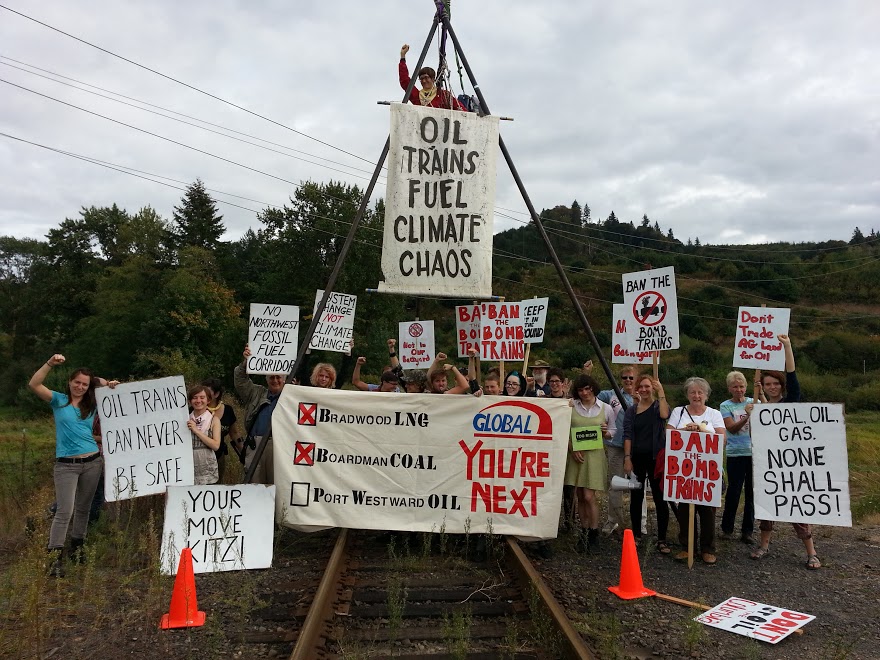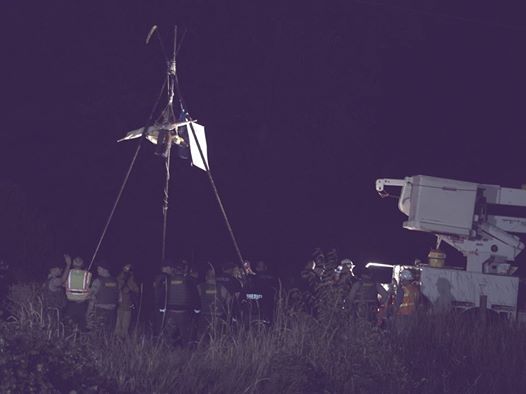September 18th, 2014
Clatskanie, OR—Climate justice activists, local Clatskanie farmers, and oil train opponents from all over Columbia County are blockading the tracks that lead to Port Westward on the Columbia River. The blockade consists of a 20-foot-high tripod of steel poles, its apex occupied by 27-year-old Portland Rising Tide activist Sunny Glover.
Any train movement would risk her life, as would any attempt to remove her from the structure. A banner suspended from the tripod reads: “Oil trains fuel climate chaos.” She has vowed to stay as long as she is able. Massachusetts-based Global Partners ships oil by rail from the fracking fields of the Bakken Shale to the blockaded facility.
From there, it is loaded onto oceangoing vessels bound for West Coast refineries. The facility was constructed with public clean energy loans and tax credits to manufacture ethanol in 2008. The owners declared bankruptcy almost immediately, and in a twist of savage irony, it became a crude oil terminal.
“Fossil fuels are catastrophically destructive,” Glover said. “Extraction ravages land, water, and the health of local communities – transport results in deadly explosions, toxic spills and dust – and as they are burned, the Earth is forced ever deeper into immense climate instability. Fossil fuel production is violence, and on an incredibly vast scale.”
Dozens are joining Glover on the tracks.
The increase in US oil production in recent years, and the consequent rise in oil train traffic, has outraged a diversity of groups and communities. Rising Tide activists, hoping to deter the most severe effects of climate change, are demanding a rapid dismantling of fossil fuel infrastructure throughout the region and the world.
Residents of areas effected by oil train traffic are horrified by the propensity of Bakken crude trains to derail in fiery explosions—a May, 2014 emergency order by the US Department of Transportation describes the trains as an “imminent hazard.”
Residents of the patchwork of farms, dikes, and waterways north of Clatskanie are fighting to protect agricultural land and salmon habitat from industrialization.
“When the crude oil trains began rolling through Columbia County, we had no prior warning—not from DEQ, not from the Port of St. Helens, not from the county, and not from the State of Oregon,” said Nancy Whitney.
“With the close proximity of our towns, and particularly our schools, and considering the track record of crude oil derailments, my fear is that the potential devastation from leakage or explosion could be astronomical—and it will happen unless these trains are stopped.”
This is the fifth oil train blockade in the Pacific Northwest since June.
“This is only the beginning,” said Noah Hochman. “We will continue to blockade until it is financially, logistically, and politically untenable for oil trains to threaten climate and communities.”
Update:
Police Risk Protester’s Life to End 9-Hour Oil Train Blockade
Yesterday afternoon, climate justice group Portland Rising Tide and allies from Columbia County erected a 20-foot-tall tripod of steel poles to blockade the Port Westward oil terminal. Dozens of police, working at night under floodlights, were mobilized to remove 27-year-old Sunny Glover from the tripod’s apex. After an initial attempt to remove her with a bucket truck—which she foiled by locking her neck to one of the tripod’s poles—the police resorted to far more drastic and perilous measures.
In a surreal scene, the amassed law enforcement officers began using a circular saw to cut through the tripod’s legs in approximately foot-long increments, gradually lowering the structure to the ground amidst a shower of sparks from the saw. Glover’s neck remained locked to a pole the entire time. Each precarious cut threatened to topple the structure. About 40 protesters shouted words of encouragement from a nearby road until she was arrested and driven from the scene around 11:30pm.
“The courage my friend Sunny exhibited tonight was tremendous,” Scott Schroder said. “Unfortunately, she lives in a world of terrifying scenarios. She can either have her life jeopardized by the police or by catastrophic climate change and exploding oil trains. She chose to resist because she understands acquiescence is the greater peril.”
The terminal, operated by Massachusetts-based Global Partners, has been controversial since its inception. At the protest today were residents of the Columbia County towns of St. Helens, Scappoose, and Clatskanie, whose homes and businesses are within the blast zone should an oil train derail and explode. Rising Tide activists are demanding a rapid phase-out of fossil fuels in order to avert a climate catastrophe that would be felt for millennia.
Protesters were critical of the tremendous mobilization of public resources to dismantle the blockade—there were approximately 40 combined fire, police, and medical personnel on site—saying it amounted to essentially another subsidy for the fossil fuel industry.
“Taxpayers have already given Global Partners millions of dollars in clean energy construction subsidies, when we thought their facility was going to be an ethanol plant,” said David Osborn. “Now the public is handing over thousands more to keep the train tracks free of people outraged by their bait-and-switch.”
This summer, Rising Tide collectives have blockaded oil train facilities in Washington and Oregon five times. The groups say they are working toward mass mobilizations that will significantly impede the ability of oil to be transported by rail in the Pacific Northwest.
“We will be back,” Schroder said. “Over and over again. And we’re bringing more people every time.”
PHOTOS, VIDEO, AUDIO: https://drive.google.com/folderview?id=0B8Tw30qC0uQib2xlLXk0cERaeVk&usp=sharing_eil
09/18 ACTION PRESS RELEASE: https://drive.google.com/?usp=folder&authuser=0#folders/0B8Tw30qC0uQib2xlLXk0cERaeVk
BACKGROUND ON OREGON OIL TRAINS AND THE CLIMATE CRISIS:http://portlandrisingtide.org/oil-trains-oregon-bakken-shale-uinta-basin-climate-crisis/




